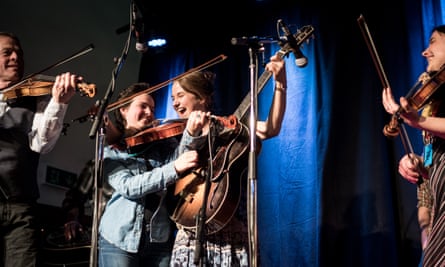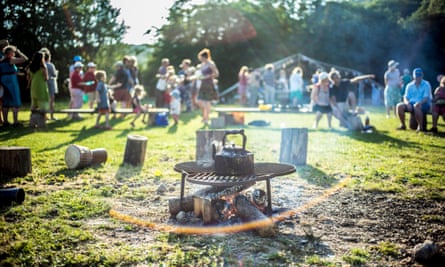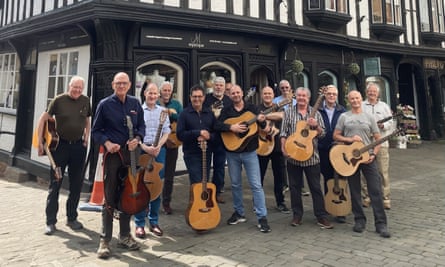Every Easter, a sleepy corner of the Cotswolds transforms into a miniature version of the Blue Ridge mountains of the eastern US. The idyllic Kingham Hill private school, near Chipping Norton, is invaded by hundreds of banjos, fiddles, mandolins, guitars, a handful of dobros, and even the occasional autoharp. The reason for this is the appropriately named Sore Fingers bluegrass and old-time music week.
My first visit to Sore Fingers was in 2008. I’d dusted off a five-string banjo I had last played as a teenager and, along with a fiddle-playing friend, had plans to form what would become the UK’s first all-female bluegrass band, the Jolenes. I was hooked from the get-go – the instant camaraderie, the total immersion and the joy of making music with like-minded folk of all levels of expertise. I loved the nerdery. Where else can you discuss the optimum angle of your banjo picks without getting funny looks? I’ve never looked back …
And I’m not the only one. Since its inception in 1996, Sore Fingers has grown from three courses to 13, and from 50 students to 250, all staying in the school dormitories or camping in the grounds (and there’s now a weekend event in October, too). For many, it’s the sense of community that draws them back: old friends are reunited and new ones made, bands are formed, hot licks and obscure tunings shared.
There are courses in everything from bluegrass to improvisation, jam sessions for every level, scratch bands, drop-in workshops and classes specifically for beginners. It’s not unknown to spot the odd celebrity, too. One year, John Paul Jones of Led Zeppelin was honing his chops in the mandolin class. But it’s the US tutors who are the big draw, and their all-star concert on the last night is the week’s high point.

A regular face is Ron Block, the multi Grammy-winning banjo player and guitarist, and member of Alison Krauss’s band. He has even been known to show up just to hang out and make the tea. “There’s a real attitude of fun, helpfulness and genuine giving,” he says when I ask him to explain the appeal. “Sore Fingers is about people encouraging one another, learning and growing – all while having a good time. It’s great fun, with lots of laughter, and I try to get over there even if I’m not teaching.”
Making music with others is the antidote to alienation. And with today’s conversations about AI taking over not just our jobs but our creative output, there is something life-affirming about coming together with our fellow humans to sing and play music. If bluegrass ain’t your jam, there are plenty of other music camps and retreats for all kinds of styles and levels. Here are five of my favourites.
Sore Fingers Easter week, 8-12 April 2024, £420 plus food/accommodation; October weekend, 20-22 October 2023, £180
Fiddler’s Retreat, Ireland

Whether you’re a symphony violinist, or just scraped a few scales in primary school, Irish fiddler Theresa Bourke has got you covered. In 2005, after a career as a successful touring musician with acts including Michael Flatley, she set up Fiddlers Retreat at her home in County Tipperary with the mission to share her love of Irish music, food and culture.
“It’s a whole experience,” she tells me. “You stay with me and my family, we have lessons in our house, explore the local area, and in the evenings can join a traditional pub session.”
Bourke is a qualified teacher and therapist, and likens the act of playing music to mindfulness and the joy of being “in the moment”. Each course is individually tailored and her top-class musician friends can be drafted in to teach guitar, banjo, flute, accordion and concertina. “People come from all over the world,” she says, “all ages, all levels, I’ve taught families and even a full fiddle orchestra. I just love to share Irish music.”
Retreats from €1,050 (£904); email [email protected] to discuss dates and retreat preference; fiddlersretreat.com
Flamenco guitar and dance, Spain

English-Spanish guitarist José Dueñas León comes from a flamenco family, and along with his sister, Ana, has been teaching the traditional Spanish music and dance form since 2008. Once a year they head to the Cortijo Romero retreat in the hills of Andalucía – the heart of flamenco country – where participants are encouraged to switch off and immerse themselves in the music and the environment.
“We pick a song at the beginning of the week,” Dueñas León says, “I teach the guitarists, my sister teaches the dancers, the groups practise together, and by the end of the week we have created a flamenco performance.”
Dueñas León is passionate about sharing his country’s music and culture – he and Ana also perform for the guests, as do local musicians, and there is plenty of time for walking and swimming. Novices are welcome and there is no need to read music as everything is taught by ear. I tell him I can play a bit of basic guitar, and before we know it, we’re deep in discussion about flamenco chords … and I’m Googling flights to Granada …
9-16 September, £880; cortijo-romero.co.uk
after newsletter promotion
Rise Up Singing, Dartmoor

Rise up Singing, a 10-day voice camp on Dartmoor, is capped at 150 people (the optimum number for a successful social group according to Dunbar’s number theory). Many of these 150 have been coming for years, but singer-songwriter and tutor Tallulah Rendall says about 20% are newcomers each year. She is passionate about the camp, because it changed her life. Burned out from her rock’n’roll music career and lifestyle in Berlin, she arrived “in a leather jacket, stilettos and red lipstick, anaemic and suffering with panic attacks. It gave me a new way of living,” she says.
The focus is on community and sharing – cooking and eating together, and of course, singing. Workshops range from sacred chants and mantras to blues and gospel, and vocal styles from Africa, the Balkans, Spain and Portugal, plus songwriting, improvisation and performance skills. “It’s about authentic connection, with music, with each other, with nature, and our voices.”
July 2024, dates tbc; adult £430, 18-25s £240, 3-17s £170 (2023 prices), riseupsinging.co.uk
Gypsy jazz and blues retreats, Shrewsbury

Acoustic guitar player Chris Quinn has, for the past decade, been transforming Shrewsbury into the UK’s hub for roots music, with retreats focusing on folk, delta blues and Gypsy jazz. The last of these runs alongside Django fest, a celebration of the music and legacy of Django Reinhardt and draws the finest Gypsy jazz musicians from across Europe. Retreat participants get front-row seats for shows each night, and learn from the masters during the day. The retreats cater for all levels of experience: players are grouped according to ability.
“You just need to be able to play a few chords,” Quinn assures me; this is backed up by videos on his website showing beginners ecstatic about how much they have learned. Accommodation, meals and tuition are in the Prince Rupert hotel in the medieval town centre, but once you pick up your guitar the outside world slips away and you’re in 1930s Paris, swinging with your very own Hot Club.
Gypsy Jazz Retreat, 12-16 October, £1,077, gypsyjazzretreats.com. Art of the Blues Retreat, 13-18 November, £1,079, rootsmusicretreats.com
Sessions and sailing, Scotland

Barry Nisbet has the best job title. “Musician and seafarer,” he tells me when I ask him to describe his profession. In 2012, Nisbet, a Scottish fiddler, guitarist and songwriter, was working in his nautical role, rerigging the Cutty Sark. Here he met Stefan Fritz, skipper of the Lady of Avenel, a 36-metre Brigantine square rigger. Together they had hatched a plan – Scottish folk music sailing holidays. Since 2016, they have transported hundreds of musicians and enthusiasts around the Scottish coast and isles, dropping in on local sessions and creating a community based on a shared love of the music (you don’t need to be an expert musician or sailor to join).
The Lady of Avenel is a beauty – a twin-mast sailing ship with berths for 12 guests in twin cabins and a spacious saloon where the musicians gather. Two tutors travel on board, offering group and one-to-one tuition. Routes vary, taking in regions and islands with their own musical styles, such as Shetland and the Orkneys. When the ship drops anchor, local musicians come on board to teach, and the guests often go ashore to entertain the remote communities. “We even played in a shearing shed once,” Nisbet recalls, laughing. “If you think it’s for you,” he says, “it probably is.”
Nisbet runs five- or six-week trips between May and September – see website for dates. A week costs from £1,295; sessionsandsail.com
